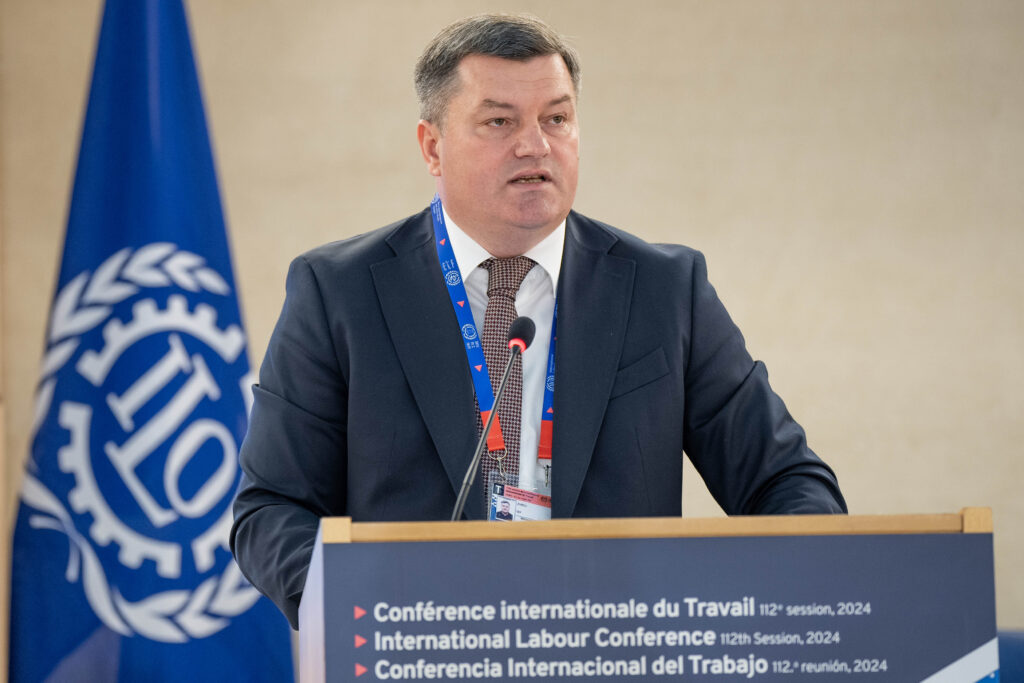On the eve of the World Day for Decent Work, marked annually around the world on October 7, the National Confederation of Trade Unions of Moldova (CNSM) organized on Friday, October 6, in the premises of the Labour Institute, a round table on “Minimum Wage according to European standards”. This year, the activities dedicated to the World Day of Decent Work are being held under the theme “It’s time for a pay rise”.
The event organized by the CNSM was attended by the Confederation’s leadership, presidents of national and regional trade union centres, representatives of the Ministry of Labour and Social Protection, the Ministry of Finance, the National Confederation of Employers of Moldova, the International Labour Organization, the Office of the People’s Advocate, the Council for Equality, the Council of Europe Office in the Republic of Moldova and the Romanian Embassy in the Republic of Moldova.
A group of trade unionists from the National Trade Union Confederation “CARTEL ALFA” from Romania, led by its President Bogdan Iuliu Hossu, also participated in the round table. In the context of World Decent Work Day, the CNSM and CNS “CARTEL ALFA” issued a joint statement stressing the crucial importance of ensuring decent jobs and fair incomes for workers. The press release can be accessed here.
In his speech to the participants of the round table, Igor Zubcu, President of the CNSM, mentioned: On this day, trade unions around the world are demonstrating their desire for decent work and a decent wage through various actions, reminding that “It’s time for a pay rise! Moreover, the crises of recent years have put pressure on workers, eroding the purchasing power of wages. In 2022, we witnessed a reduction in the real value of the wage by 10%, although during the year, we managed to establish a single minimum wage in the country and increase it by almost a third, this increase we see has been insufficient for wage earners in the country.
Unfortunately, at the moment we cannot talk about a decent living, given that the minimum wage is 4000 lei. For several years, trade unions have insisted on the implementation in the Republic of Moldova of the provisions of the European Social Charter (revised), which states that countries that have ratified it must recognize the right of workers to a sufficient wage to ensure them and their families a decent standard of living and recommends that countries set the minimum wage at 50% of the average monthly wage in the country,” stated the president of the CNSM.
“I should note that the Directive of the European Parliament and of the Council on adequate minimum wages in the European Union No 2041, adopted in 2022, also expressly states that the minimum wage in each country must be at least 60% of the median wage or 50% of the average wage. No less importantly, the directive also stipulates that at least 80% of employees should be covered by collective bargaining. At present, only around 40% of employees in the Republic of Moldova are covered by collective bargaining agreements. Given that our country has obtained the status of candidate for accession to the EU, I believe that we must be guided by the provisions of this directive when increasing the minimum wage if we want to prevent the exodus of the workforce, especially young people from the country. However, the annual trend of reduction in the number of employees and the significant share of the informal economy is an alarming signal for the sustainability not only of the state social security budget, but also of the national public budget”, stressed the trade union leader.
This week, at a meeting with representatives of the International Monetary Fund mission, trade unionists reiterated the need to review the minimum wage. According to them, in the case of the Republic of Moldova, 50% of the average wage forecast for 2023 of 11700 lei would result in a minimum wage of 5850 lei.
In several panel discussions, the participants of the round table discussed the trade unions’ vision of a minimum wage in line with EU standards, Romania’s experience in setting the minimum wage, the authorities’ and employers’ vision of the minimum wage in the Republic of Moldova, and exchanged views on setting the minimum wage.
Also on Thursday, 6 October, the CNSM organised an information and awareness-raising campaign to promote decent work and communicate about the work of trade union organisations. CNSM tents were set up in the Europe Square and the pedestrian street “Eugen Doga”. The trade unionists distributed information materials and advocated for decent work, decent wages, social equity, social and economic protection according to EU standards.
In this context, we add that decent work means respect for several principles: a stable and secure job; a decent wage that allows the employee to live in dignity; work with equal fundamental rights; work in safe and healthy conditions; the possibility of lifelong learning; the guarantee of social protection in different situations; the possibility for citizens to organise among themselves to represent their interests collectively; the right to negotiate and the binding nature of collective agreements.
World Decent Work Day was established at the initiative of the International Trade Union Confederation (ITUC) and, according to the ITUC, it is an opportunity for trade unions around the world to mobilise to draw the attention of the authorities to the challenges faced by workers in different parts of the world.
More images from the round table on “Minimum Wage by European Standards” can be found here.
Images from the information campaign organised by the CNSM can also be found here.

